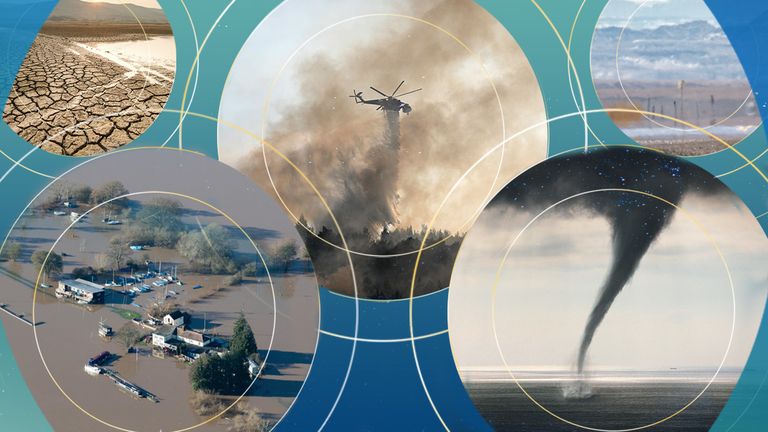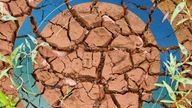Climate change: Global-warming greenhouse gas levels in atmosphere hit record high
If emissions continue to increase, so will global temperatures and weather extremes such as intense heat and rainfall, ice melt, sea-level rise and ocean acidification, UN scientists have warned.
Monday 25 October 2021 12:23, UK
Levels of planet-heating greenhouse gases in the atmosphere reached record highs again last year, UN scientists have warned just a week before global climate negotiations begin.
Levels of carbon dioxide (CO2) and other heat-trapping gases in the atmosphere rose at a faster rate in 2020 than at any point during the previous decade, with the trend continuing into 2021, the UN's World Meteorological Organisation (WMO) said.
Even lockdowns triggered by the COVID-19 pandemic "did not have any discernible impact on the atmospheric levels of greenhouse gases and their growth rates", the report said, although there was a temporary decline in new emissions.
PM attacks Coca-Cola as UN scientists issue stark warning about our 'way of life' - COP26 latest
If greenhouse gas concentrations continue to rise at current rates, the world will overheat "far in excess" of the Paris Agreement targets of 1.5-2C above pre-industrial levels, said WMO secretary-general Professor Petteri Taalas.
As long as emissions continue, global temperature will continue to rise, which will bring more weather extremes including intense heat and rainfall, ice melt, sea-level rise and ocean acidification, accompanied by far-reaching socioeconomic impacts.
The Greenhouse Gas Bulletin contains a "stark, scientific message for climate change negotiators at COP26", warned Prof Taalas.
Leaders and negotiators will meet in Glasgow from next Monday for two weeks of intense climate negotiations, COP26, widely regarded as the world's best last chance to avoid climate breakdown.
Prof Taalas urged the world to "revisit our industrial, energy and transport systems and whole way of life".
"The needed changes are economically affordable and technically possible. There is no time to lose," he added.
Tom Burke, E3G co-founder and chairman said the report sends a "very clear and urgent message to the political leaders gathering in Glasgow.
"You are not doing enough, fast enough, to prevent dangerous climate change."
Subscribe to ClimateCast on Spotify, Apple Podcasts, or Spreaker.
Concentration of CO2, the most important greenhouse gas, reached 413.2 parts per million in 2020 and is 149% of the pre-industrial level. Methane (CH4) is 262% and nitrous oxide (N2O) is 123% of the levels in 1750 when human activities started disrupting Earth's natural equilibrium.
Prof Euan Nisbet, of the Greenhouse Gas Group, Royal Holloway, said the "extreme growth" of methane was "especially worrying".
"[This] suggests strong feedbacks may be at work, the warming feeding the warming," he said.
Watch the Daily Climate Show at 6.30pm Monday to Friday on Sky News, the Sky News website and app, on YouTube and Twitter.
The show investigates how global warming is changing our landscape and highlights solutions to the crisis.





